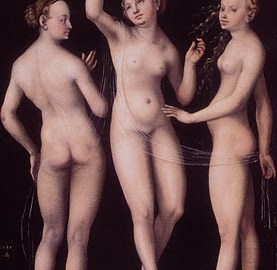Taking Ownership: The Louvre Asks the Public to Pitch In

For the first time in its 217-year history, the Louvre, perhaps the greatest museum in the world, is asking the French public for financial help to purchase a painting. Even after tapping their own resources, the Louvre found itself 1 million Euros ($1.35 million USD) short of the purchase price of German Renaissance painter Lucas Cranach the Elder’s 1531 painting Les Trois Grâces (The Three Graces in English; shown above). “It’s a work that is amusing, troubling and mysterious, as well as very sensual at the same time,” Louvre president, Henri Loyrette, says in defense of his belief that Cranach’s ladies could be an iconic work for the museum along with more familiar faces such as Leonardo da Vinci’s Mona Lisa and the Venus de Milo. But not everyone agrees with that belief or the idea that the public should pitch in and aid the effort to own the enticing trio.
The obvious complaint centers around taxes. The Louvre gets much of its funding from the government, which gets it from taxing the French people. All of the money comes from us, the angry public clamors, so why should we pony up another cool million or so for another piece of art when unemployment and a world-wide recession continue to dog us? It’s hard to argue with those who feel that adding another masterpiece, no matter how iconic, simply isn’t worth it right now. The Louvre has set up a website as a virtual kitty to which art lovers may contribute to the campaign. The fact that Cranach’s painting has never been publicly displayed seems to have inspired the Louvre’s directors to make a push to right that wrong. However, in the process of righting one wrong, they might be committing another.
Museums exist at the pleasure of the public, even one as old and revered as the Louvre. Patrons coming through the door keep the institution alive, both financially and metaphorically. Without the oxygen of public interest, museums suffocate in the stuffy air of their own irrelevance. The Louvre risks a major public relations disaster with this campaign. As much as it pains me that such a beautiful and significant work languishes unseen, it pains me even more that the Louvre seems so tone deaf to the cries of the French public right now. In a land that once boiled over after the (probably apocryphal) phrase “Let them eat cake!”, the Louvre seems to suggest, “Let them feast on Cranach!”
This episode reminds me of the curious case of Kempton Bunton, a retired British bus driver living on a meager pension in the 1961 who loved his television. When an American collector threatened to take Francisco Goya’s Portrait of the Duke of Wellington away from England, the British government bought it back and placed it in the National Gallery in London. The government paid for that purchase by raising the television license fee imposed on all British television lovers, including Mr. Bunton. In retaliation, Bunton climbed through a bathroom window of the National Gallery early one morning and stole Goya’s painting. Bunton soon sent a letter to the authorities asking the government to donate money to allow the poor to pay their television licenses and amnesty for the thief in exchange for the return of the Duke. The government turned that offer down. Four years later, Bunton returned the painting anonymously and then gave himself up a few days later. He served 3 months of prison time and became a folk hero to those everywhere who hate taxes and love their telly.
I’m not suggesting that a French Kempton Bunton lurks somewhere biding his time to crawl through the loo and snatch the Cranach. What I am saying is that the public at large pays little attention to the arts as it is. Making that scant attention turn negative seems unwise. Aside from a trip to case the joint, slipping through that bathroom window may have been the only time in his life that Mr. Bunton entered the National Gallery. If the Louvre lets itself get carried away in icon hunting, they may allow the public’s good will to slip away and go down the toilet.




